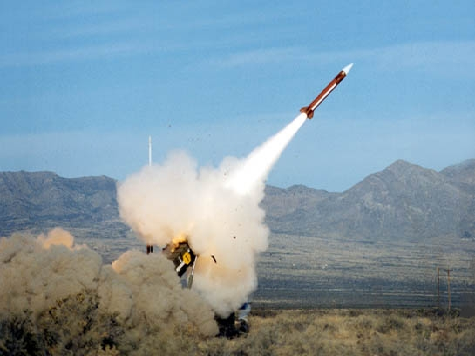Just whom do you trust more with defending America, Mitt Romney or Barack Obama?
Okay, that was too easy. Let’s put it another way: which candidate railed about George W. Bush’s missile system, which strengthened long-range defenses (calling his own system “stronger, smarter, and swifter”), while opting instead for defenses in Europe against shorter-range Iranian missiles, but now may have to backtrack because Iran is likely developing long-range missiles?
Yup. Obama’s your man. And no less than Vladimir Putin acknowledges that Romney’s decisiveness on national defense is giving him pause. After hearing Romney assert that Russia is “without question our No. 1 geopolitical foe” while promising “less flexibility and more backbone,” Putin said that Russia’s opposition to an American anti-missile shield in Europe is sound policy. He said Romney,
… has once again confirmed our approach to the issue of missile defense is the right one. He has strengthened our negotiating position on this sensitive and very important issue. The main thing for us is that even if Romney does not win this election, in four years he or somebody with similar views may come to power. And we must take that into account when we consider how to provide for the security of the Russian Federation well into the future.
Russia is upgrading its offensive nuclear arsenal; in May Russia’s top general said that Russia could carry out pre-emptive strikes on future missile defense installations in Europe. With that kind of belligerence, is Obama the man we want defending us?
With the Russians looking for offensive room, Obama’s pie-in-the-sky approach to national security is finally drawing some overt criticism. The National Research Council convened a panel of top scientists and military experts, considered to be the nation’s top group of scientists, who concluded that Obama’s plans have failed. They suggested that Obama abandon his plans and follow up with Bush’s. Even Philip E. Coyle III, a former national security official in the Obama White House, agreed that the present system that should be rebuilt from top to bottom because it was aimed toward “producing and fielding hardware” rather than actually devising ways to deflect enemy attacks. The report said that the current generation of antimissile arms was “fragile” and full of “shortcomings that limit their effectiveness against even modestly improved threats.”
L. David Montague, the panel’s co-chairman and a retired president of Lockheed Martin Missiles and Space, said:
For too long, the U.S. has been committed to expensive missile defense strategies without sufficient consideration of the costs and real utility.
In 2002 Bush announced plans to deploy a system that now consists of 30 ground-based interceptors in Alaska and California that are meant to destroy enemy warheads while in flight. In September 2009, Obama stopped focusing on protecting the continental United States and instead focused on defending Europe and the Middle East.
The report only stated what the group of scientists absolutely agreed in, and thus was very sharp and limited in its criticism, which makes its criticism much more powerful. As Montague simply stated, “What we’ve agreed on is what we said in the report.”
Obama has now been called out for his fecklessness. Will the American people listen?
|
|
|
|
|
|

COMMENTS
Please let us know if you're having issues with commenting.